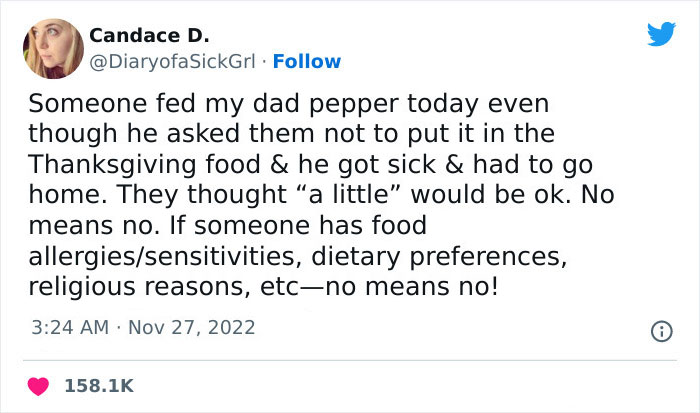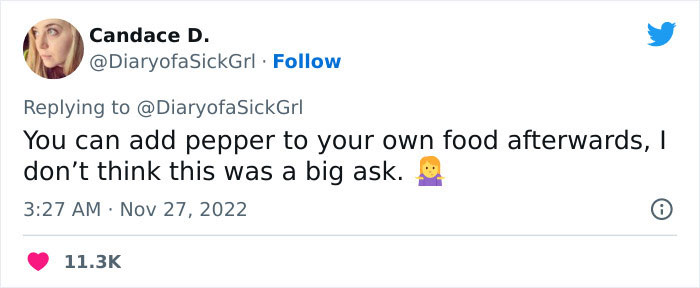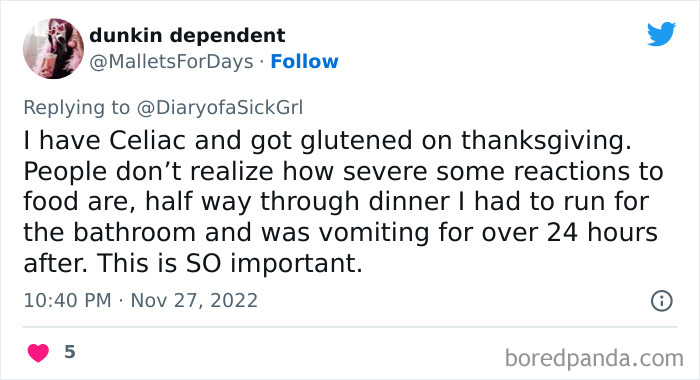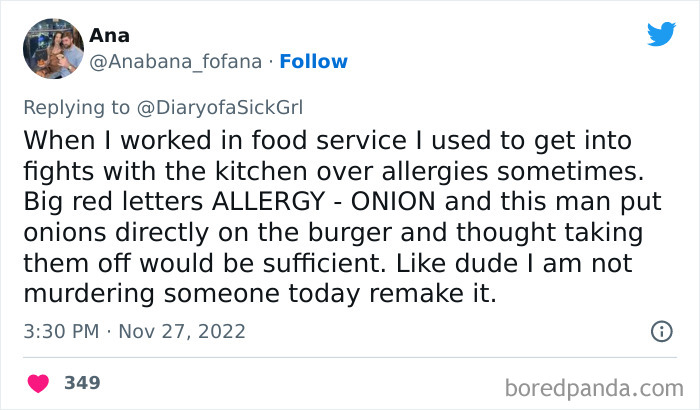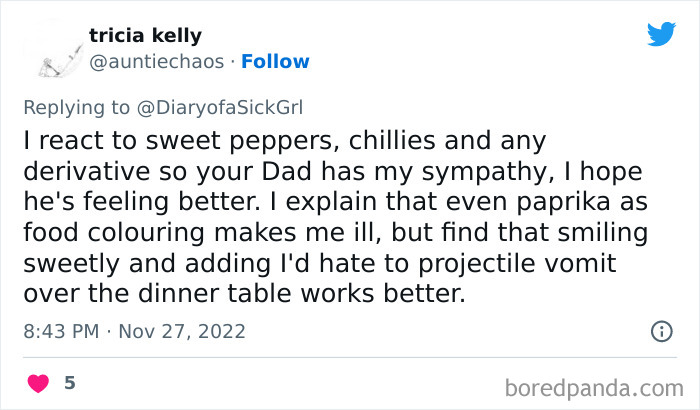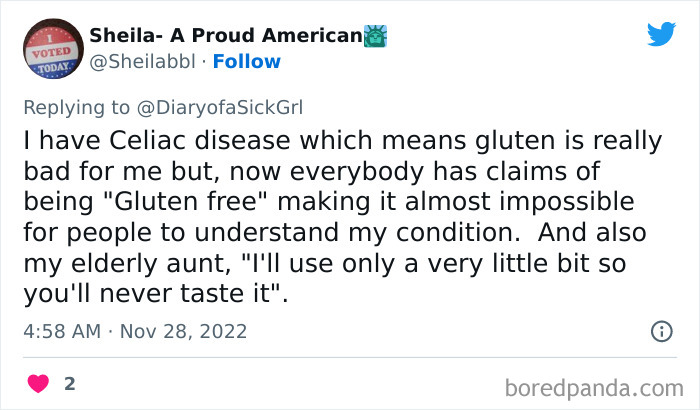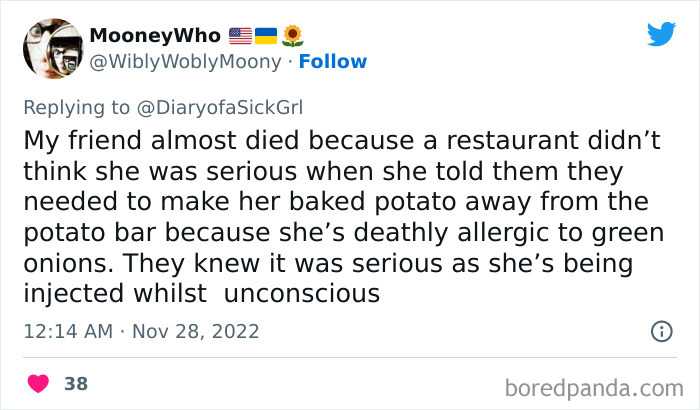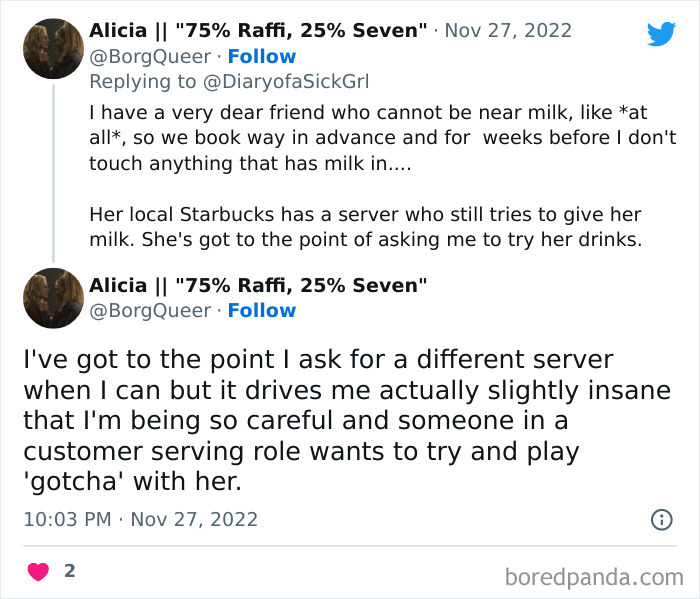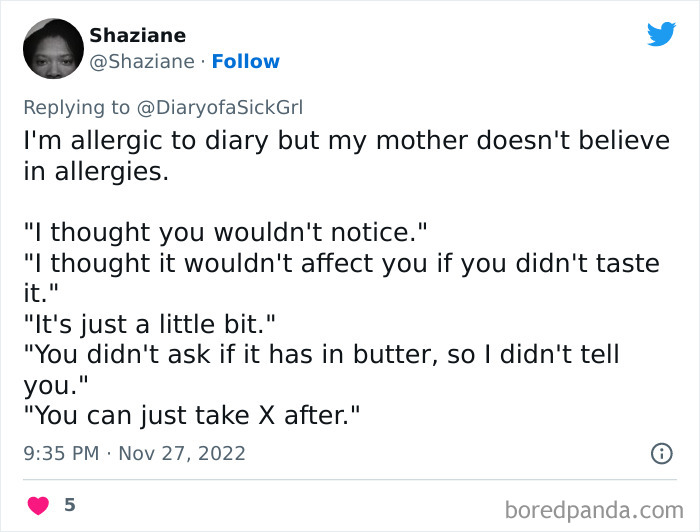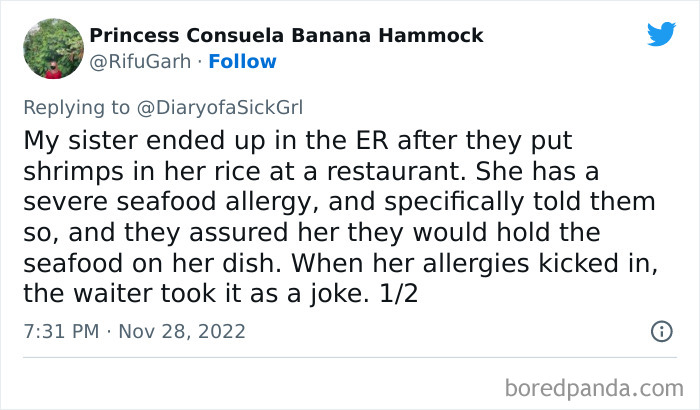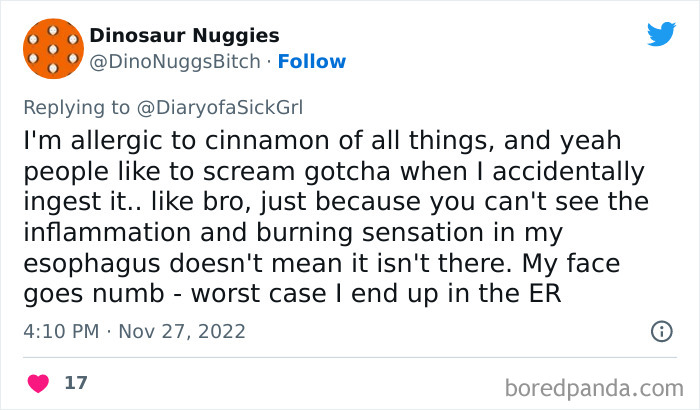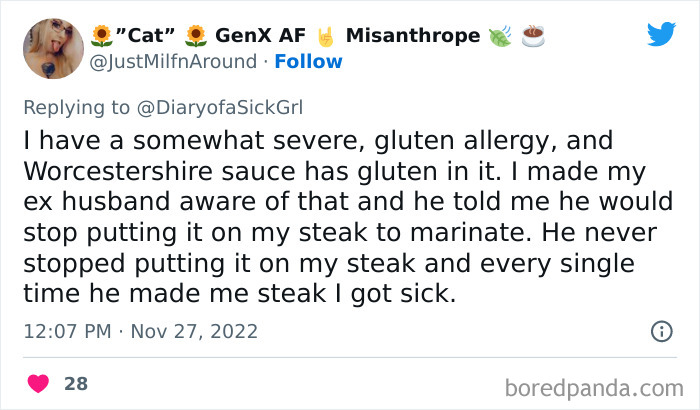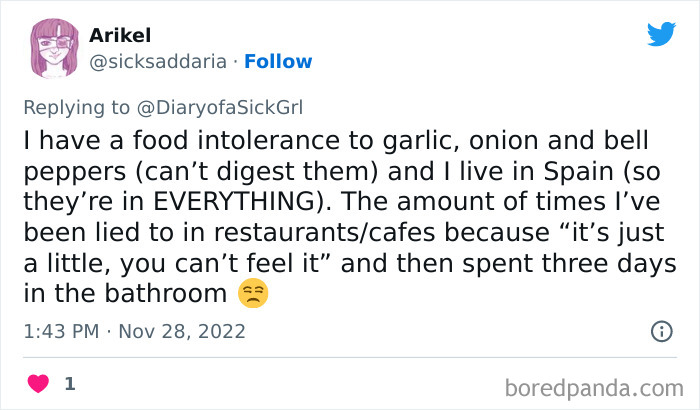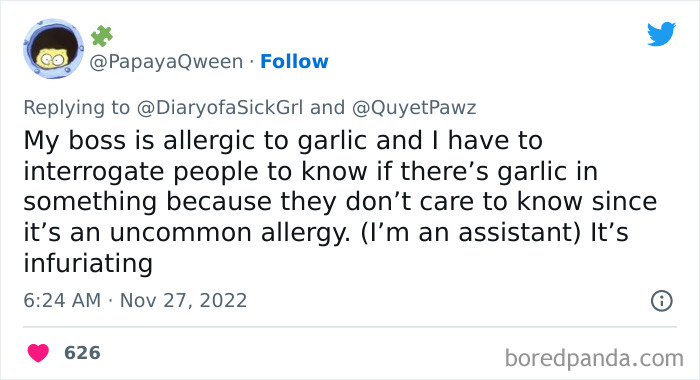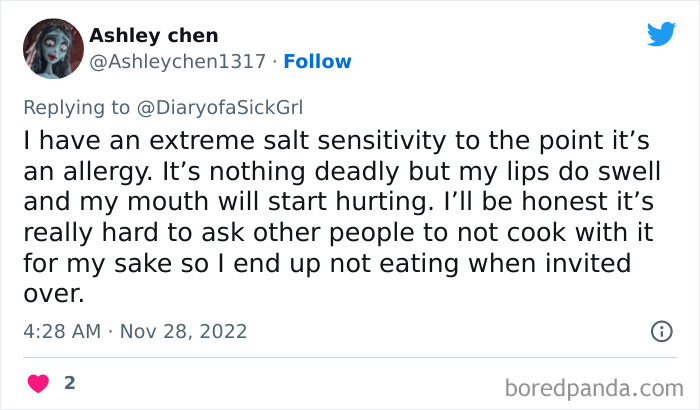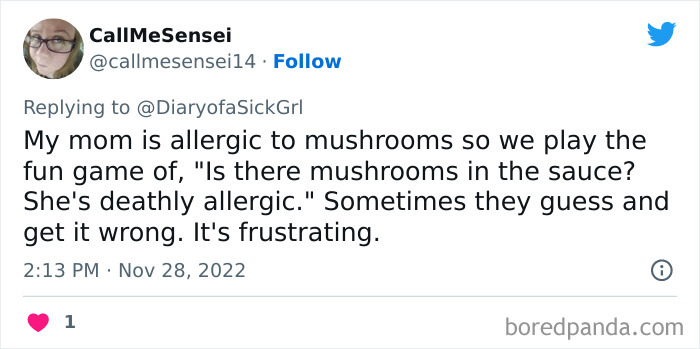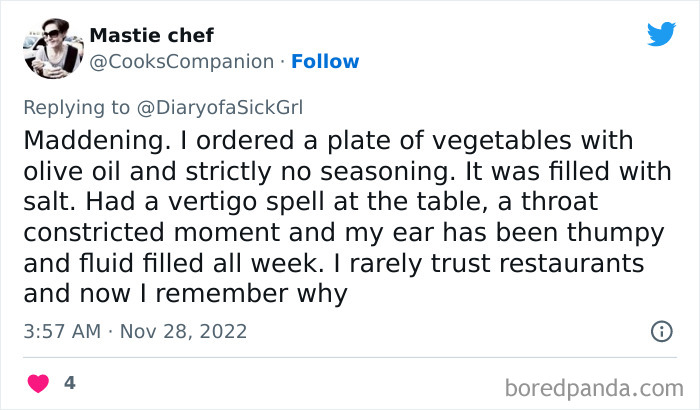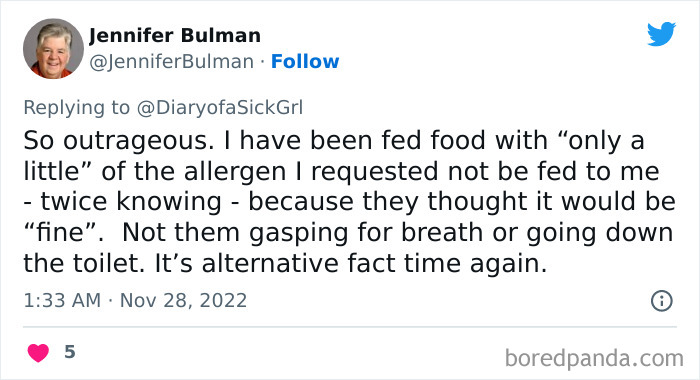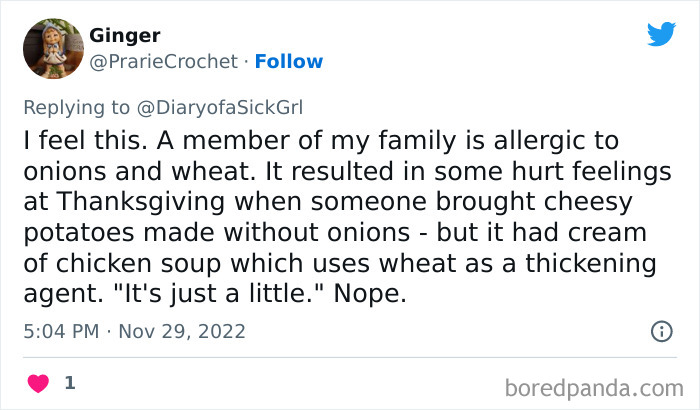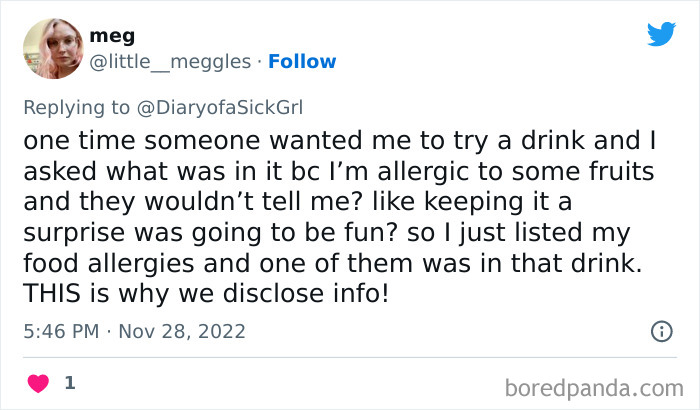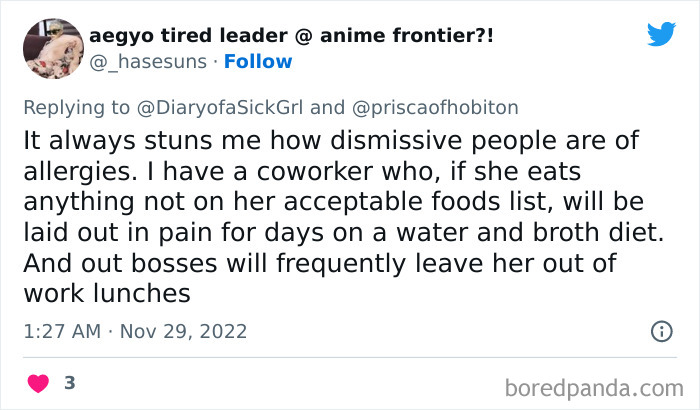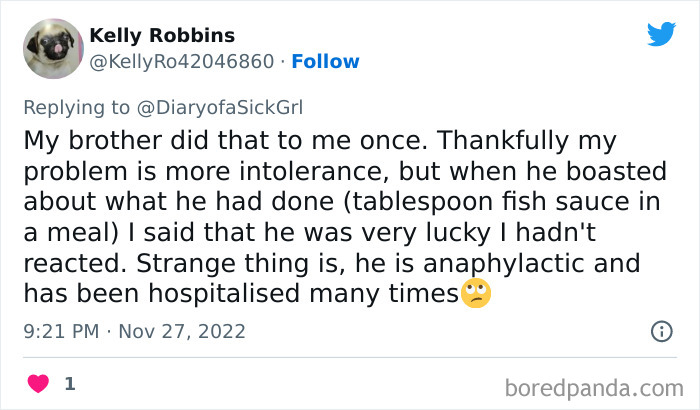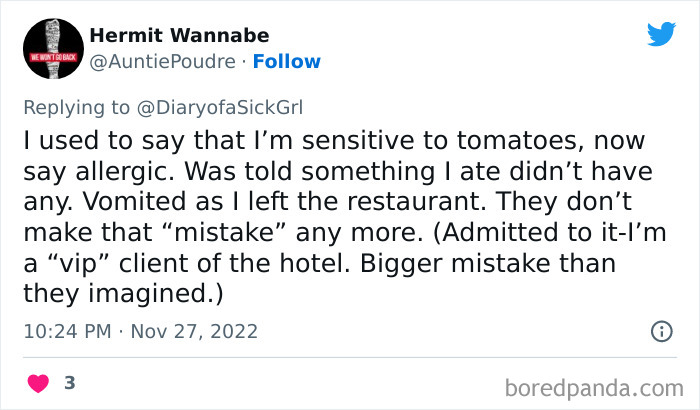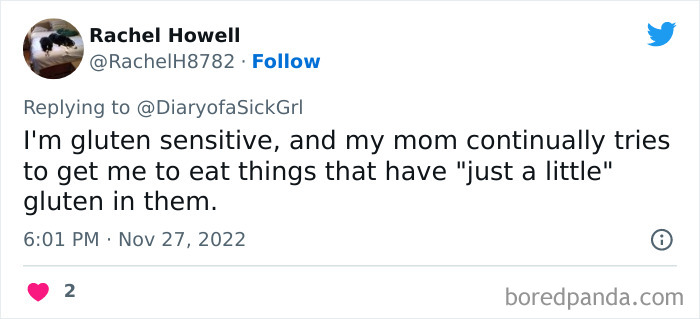As miraculous and wonderful as the human body is, at the end of the day it’s incredibly fragile. Unlike cats, we only have one life to live, one chance to make it right before we end up on the judgment table between Heaven and Hell. Where we shall end up, who knows, but the fact is—having a food allergy can speed that process up significantly.
Allergies can be annoying to begin with; however, they can also be incredibly life-threatening, with one single spoonful of forbidden fruit landing you a ticket to the emergency room. The situation is made a lot more complicated when people decide to ignore them, brushing them off as just a chosen preference.
People have shared their own personal experiences of coming incredibly close to the rainbow bridge, or stories recalling the times when they witnessed the blatant ignoration of their very important needs, all prompted by Candace D.’s tweet, which gathered 158.3K likes on the platform.
Bored Panda had the pleasure of speaking with Dave Bloom, the CEO and Co-Founder of SnackSafely.com, who was kind enough to answer some of our questions.
Don’t forget to upvote the stories that shock you the most, and leave your thoughts, opinions, and similar stories in the comments below. If by the end of this article you’re still craving some food-related stories, here’s an additional article for you! You’re welcome, now let’s chomp into it!
#1
Image credits: MaxRadniecki
Food allergies are estimated to affect 4 to 6 percent of children and 4 percent of adults, according to the Centers for Disease Control and Prevention. You can even develop an allergy to foods you have eaten for years with no problems, as the immune system creates antibodies to the allergen of choice over time—new fear unlocked! I think it’s safe to say that no one would willingly choose to be allergic to any given food item.
Dave Bloom, the CEO and Co-Founder of SnackSafely.com, a company aiming to improve the lives of those coping with food allergies, and to educate others as a means of eliminating anaphylaxis, told Bored Panda that even a trace amount of an allergen can lead to a serious, life-threatening reaction.
“We always coach our readers with food allergies and celiac disease to know PRECISELY how their food has been prepared and if they have any doubts to forgo eating,” he said. “Even a family member or friend with the best intentions can cause a serious reaction if a trace of their allergen makes its way into their food inadvertently via cross-contact.”
#2
Image credits: Wingsfan408
#3
Image credits: MalletsForDays
Dave explains that there are 2 main reasons why people ignore their loved-one’s dietary needs, as seen in the multiple accounts mentioned in this article. “Fad diets have made people increasingly skeptical about dietary restrictions, and people are uninformed about the danger of allergic reactions; they equate reactions with a hive or a rash, but don’t understand that reactions can easily escalate into full-blown anaphylaxis and lead to hospitalization or death.”
Finally, Dave believes that the best way to prevent a tragedy is to educate people of the few basic tenets of food allergy. The American College of Allergy, Asthma and Immunology (ACAAI) explains that symptoms of a food allergy can range from mild to severe. Just because an initial reaction causes few problems doesn’t mean that all reactions will be similar; in fact, the reactions are likely to get worse over time.
A food that triggered only mild symptoms on one occasion may cause more severe symptoms at another time, the most severe being anaphylaxis—a life-threatening reaction that impacts breathing, blood pressure, and heart rate.
While any food can cause an adverse reaction, eight types of food account for about 90 percent of all reactions: eggs, milk and dairy, peanuts, tree nuts, fish, shellfish, wheat, soy, and sesame. Thus, the primary way to manage a food allergy is to avoid consuming the food that causes you problems. Yet avoiding an allergen is easier said than done.
#4
Image credits: Anabana_fofana
#5
Image credits: kimboslice2103
#6
Image credits: meloncauly
Some people believe that they know what’s best, adding in a little smidge of the forbidden goodie because the person will not even be able to taste it! Wow, isn’t that called poisoning, Barbara? Someone should send you to jail, darlin’. How about giving meat to a vegan? Meat’s good for you right? No, it could mean their death sentence, Barb!
These stories come in abundance, as we’re exploring but a teardrop in the vast ocean of ignorance and blatant malice. Or is there a little bit more to it? Let me introduce you to the cognitive bias called the Dunning-Kruger effect!
#7
Image credits: Vet_Grandma
#8
Image credits: auntiechaos
#9
Image credits: HelentheMiniCo1
As described by Psychology Unlocked, it’s a phenomenon where people seem to be unaware of their incompetence and ignorance. They lack skills or knowledge and greatly overestimate their expertise and talent, and it seems this very much fits with the types of people a lot of these Twitter users faced in their lifetimes.
“Knowing how competent we are and how our skills stack up to other people’s is more than a self-esteem boost,” David Dunning, American social psychologist and professor of psychology at the University of Michigan, explained.
“It helps us figure out when we can forge ahead on our own decisions and instincts and when we need, instead, to seek out advice. But,” he added, “psychological research suggests that we’re not very good at evaluating ourselves accurately. In fact, we frequently overestimate our own abilities.”
#10
Image credits: craziemamarose
#11
Image credits: DJGolfClap
#12
Image credits: Sheilabbl
Researchers argue that people are not only incompetent, but their incompetence robs them of the mental ability to realize just how inept they are. These kinds of people tend to overestimate their skill levels, fail to recognize the genuine skill and expertise of other people, and fail to recognize their own mistakes and lack of skill.
So what does this mean in this situation? In simple terms, the concept of food allergies was simply too complex or too unfamiliar to accept; hence they decided to attempt to shift the reality back to what they believed to know to be true and correct, hoping that the situation would simply just disappear and they’d have been right all along.
Admitting to mistakes takes effort, and no one really wants to do that. But it’s better to turn off any judgment and predispositions ringing off in one’s brain, listen to the person expressing their needs, and do the best one can do to accommodate them so that apologies don’t need to then be uttered at the coffin.
#13
Image credits: Owlune
#14
Image credits: WiblyWoblyMoony
#15
Image credits: BorgQueer
Thankfully, all’s well that ends well. What can we learn from this? A lot actually, but the main thing is potentially not to be a jerk to those with food sensitivities, preferences, and allergies. Because none of us are here to act as judge supreme; we’re here to have a good time and do good.
Let us know your thoughts in the comments below, and of course, don’t forget to upvote the stories that you found to be the most interesting and shocking. I’m sure there’ll be quite a few of those… Happy scrolling, curious learning, and I hope to see you all again very soon in the next one!
#16
Image credits: RachelWhelband
#17
Image credits: SkipItForNow666
#18
Image credits: starrfire71
#19
Image credits: Shaziane
#20
Image credits: helebore1997
#21
Image credits: RifuGarh
#22
Image credits: DinoNuggsBitch
#23
Image credits: 2PupsMommy
#24
Image credits: JustMilfnAround
#25
Image credits: sicksaddaria
#26
Image credits: PapayaQween
#27
Image credits: Ashleychen1317
#28
Image credits: NiceJewishBoi
#29
Image credits: callmesensei14
#30
Image credits: CooksCompanion
#31
Image credits: JenniferBulman
#32
Image credits: PrarieCrochet
#33
Image credits: little__meggles
#34
Image credits: Adela_Terrell
#35
Image credits: _hasesuns
#36
Image credits: KellyRo42046860
#37
Image credits: AuntiePoudre
#38
Image credits: TraderMike31
#39
Image credits: MrJason300
#40
Image credits: RachelH8782
Go to Source
Author: Indrė Lukošiūtė
